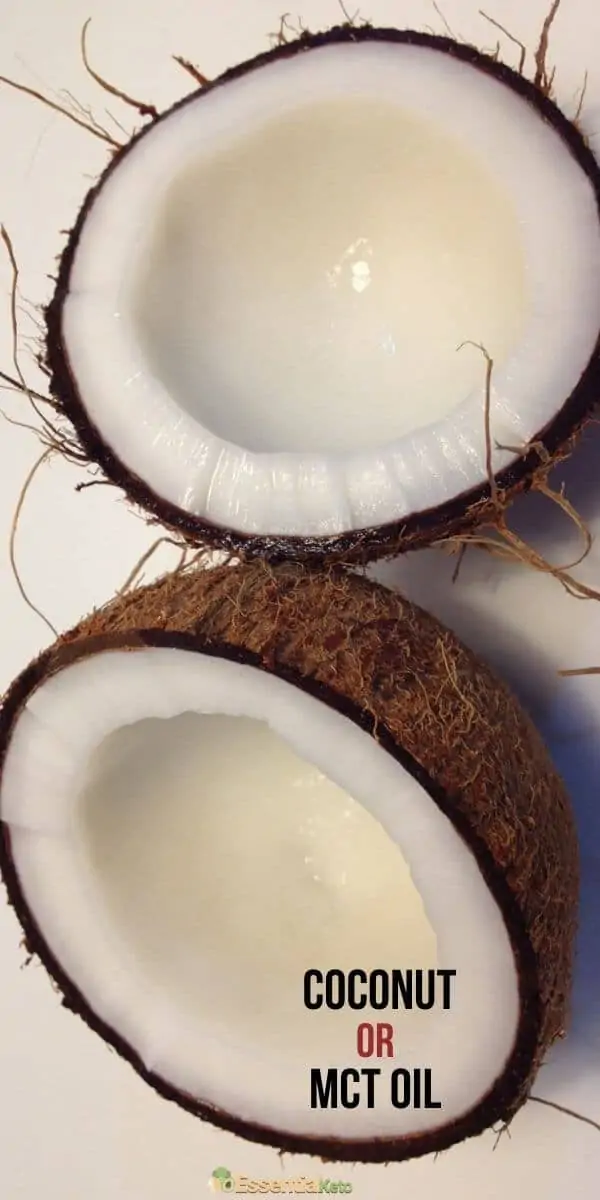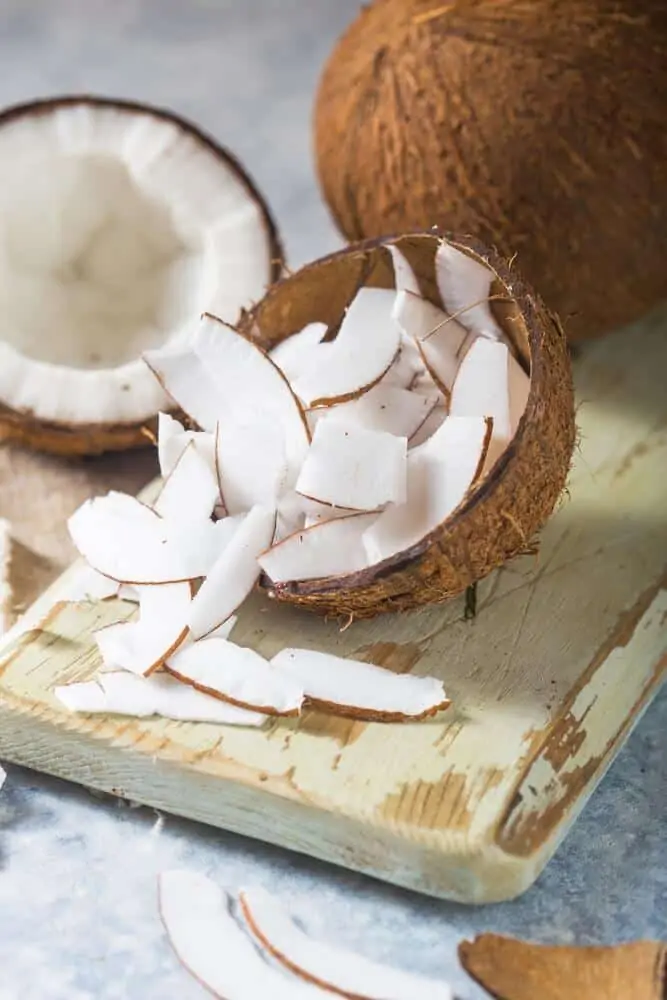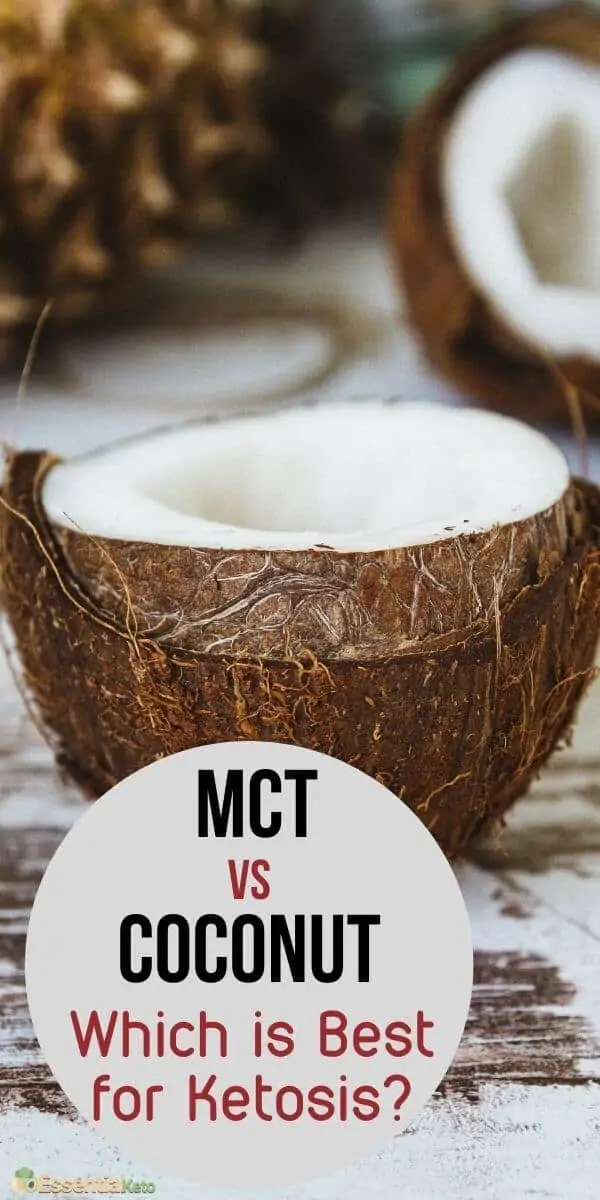Coconut Oil vs MCT Oil: Which is Better for Keto?
Is MCT oil the same as coconut oil?

Not quite, they both derive from coconuts but there are differences.
Today we look at the similarities and differences and when to use which.
For most of us, when we start a ketogenic diet, our first objective is to increase our fat intake and to substantially reduce our carbs.
We want to change our fuel from sugar to fat. We want to get our bodies into ketosis and keep it there.
There are many good fats we can add to our diet – one of which is from coconuts. We can add it in the form of coconut oil, butter, and MCT oil.
In this article, I consider the difference between MCT oil and coconut oil as they relate to keto. But before we can do that, we have to understand what a coconut is.
So, let’s briefly have a look at the makeup of a coconut, how the oil is extracted, the nutritional value, and the fat structure.
What is a Coconut?
The makeup of a coconut
Coconuts consist predominantly of saturated fat with a small element of monounsaturated (Oleic) fat and an even smaller portion of polyunsaturated fat.
Extraction
As keto enthusiasts, we consume various parts of the coconut. For instance, we’ll use the flour in our baking. But for this article, we are focused on the oil.
The oil can be extracted in a number of ways starting out with a dry or a wet process to extract it from the flesh.
It can then be further processed to create a refined oil with no taste, a hydrogenated oil with a higher melting point or a fractionated oil that removes all but one or two of the fatty acids.
Nutritional value
One tablespoon of coconut oil contains 121 kcal, 13.47 grams of fat, zero carbs, and zero protein.
For a full nutritional breakdown, visit the USDA nutritional database here.
Fat Structure
Fats consist of different types of fatty acids. These fatty acids are classified as short, medium and long-chain triglycerides.
The basic fatty acids found in coconut oil are as follows:
The first four acids, C6 to C12 are defined as medium-chain triglycerides or MCTs.
C14 and beyond are defined as long-chain.
What does this mean and why does it matter?
In general, the shorter the chain, the easier it is for your body to turn the fatty acids into energy that you can use.
As highlighted earlier, when we follow a ketogenic diet, we want to change our fuel from sugar or glucose to ketones and MCTs help you do that.

Coconut Oil vs MCT Oil
So, let’s recap…
What is Coconut Oil?
It is an oil consisting of all the fatty acids listed above. So, it includes both the medium and the longer chain triglycerides.
Almost half of coconut oil consist of the C12 triglyceride lauric acid.
What is MCT Oil?
Commercial MCT oil is further concentrated and processed and consists only of the "shorter" medium-chain triglycerides.
They are usually a blend of C8 and C10 or pure C8 – caprylic acid.
Effectively MCT oils are further processed to remove the lauric acid and the longer chain triglycerides.
Lauric Acid – C12
It may not be exactly that simple, but in a nutshell, when you decide between coconut and MCT, the question is –
Do I want lauric acid in my oil or not?
Lauric acid is defined as a medium-chain triglyceride, but there is a view that it behaves more like a long-chain triglyceride.
Does this matter?
Yes!
And the reason why it matters is that lauric acid, unlike C8 and C10, has to be processed through the liver.
That is a longer process than required by the shorter chain oils and therefore the energy obtained from lauric acid may be slower and less intense than that obtained from C8 and or C!0 formulations.
So, if your main goal is ketosis and the benefits of ketosis, then the shorter chain MCTs may be what you want.
Lauric acid though has lots of benefits though.
And
It is also not just about the lauric acid.
Here are more factors to consider when you decide which of these two oils you want to add to your daily diet.
Other Considerations
Processing
If you prefer a product that is less processed and more “whole” then you probably want coconut oil and ideally an organic one like the products you'll find at Viva Labs.
Both are processed to extract the oil from the fruit, but MCT is further fractionated to isolate specific fatty acids.
What do you need it for?
I wouldn’t cook with MCTs, whereas coconut oil has a reasonably high cooking point and can be used at low to medium temperatures.
For ketosis
Both will support ketosis, but the shorter MCTs may be better at facilitating this process.
Taste
When I buy coconut oil, I always buy it as natural as possible, so the taste of coconut is usually strong. On the other hand MCTs are processed and does not taste like coconut.
Price
MCT oil is more expensive.
In Conclusion
They are both healthy and very much part of a ketogenic lifestyle.
When should I use coconut oil and when should I use MCT oil?
That really is a personal choice based on what your goal is and what you want to achieve.
Personally I add MCTs and grass-fed butter in my morning coffee. My favorite MCT oil is this pure C8 Bulletproof oil.
You can read my review of the best C8 MCT oils and my explanation for why I prefer pure C8 oils.
The main reasons why I use MCT oil rather than coconut oil, are the mental clarity and immediate energy boost and not being hungry for hours.
I do like to swap things around, so some days I add coconut oil and butter to my coffee.
I prefer coconut oil or butter in baking and one of my favorite recipes is this fat bomb.
So, whichever fat you prefer in the MCT oil vs coconut oil debate, be sure to consume both regularly as they are essential fatty acids that our bodies can’t produce on its own.


